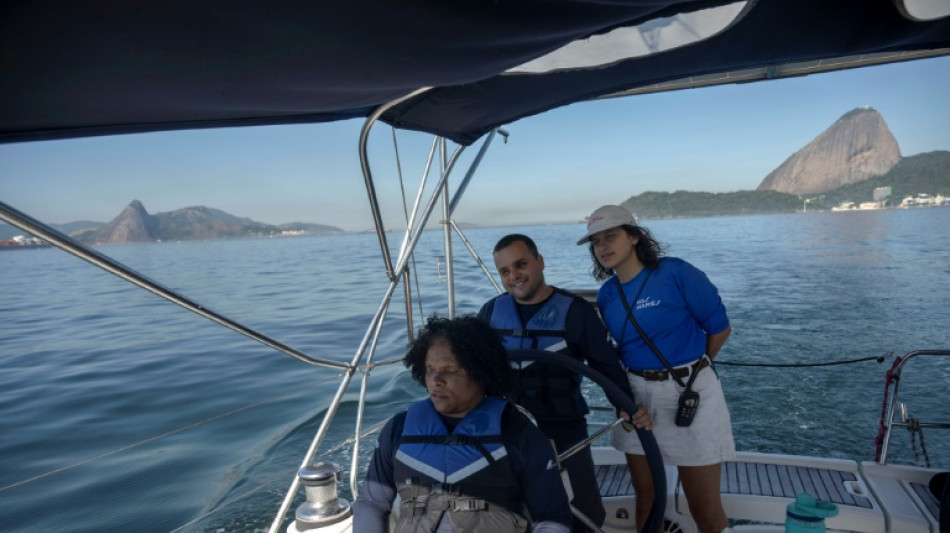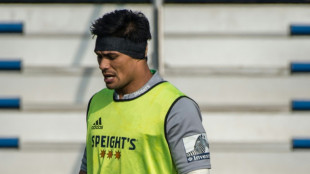
'You try not to bump into things:' blind sailing in Rio

Fernando Araujo could feel the sea breeze on his face at the helm of a 40-foot yacht zipping across Rio de Janeiro's Guanabara Bay in bright sunshine.
He navigated confidently, despite not being able to see his stunning surroundings, including Rio's iconic Sugarloaf mountain.
"You are being guided by a blind man!" Araujo, who lost his sight shortly after birth due to excess oxygen in his incubator, told his fellow sailors jokingly.
Araujo was one of five Brazilians with visual or hearing disabilities who were shown the ropes on a yacht recently during a three-day sailing course run by the Nas Mares environmental organization.
The rookie mariners were first schooled on vessels in Rio's main marina before testing their chops in Guanabara, the big natural harbor at the heart of Rio.
As a para skateboarder, Araujo, 31, knows a thing or two about trying to stay upright.
But sailing is "very different," he said, adding: "I never imagined myself being skipper of a boat."
A year before it hosted the Olympic Games and Paralympics in 2016, Brazil passed an Inclusion of People with Disabilities Act aimed at eliminating hurdles to accessing transport, housing, services, education and sport.
Latin America's biggest country also tackled the issue of funding by allocating 0.87 percent of all lottery funds to paralympic sport.
Eduardo Soares, a 44-year-old physical education teacher from Sao Paulo who took part in the free sailing course, said the improvements had been life-changing.
"Over the past 10 years, things have become much easier," Soares, who was born with a visual disability, said.
- Steering by sound, smell, touch -
Some 6.5 million of Brazil's 210 million citizens are visually impaired and 2.3 million have hearing disabilities, according to the IBGE statistics institute.
While many wealthy countries, including Australia, Britain, France and the United States, have sailing associations for the blind or partially sighted, few in Latin America get the chance to skipper a boat.
Araujo, a lover of extreme sports, said sailing was a way of combatting the isolation of people with disabilities, many of whom "don't like to try new things."
His heightened sense of hearing, smell and touch made him and his crew particularly receptive to non-visual stimuli on the boat, including the direction of the wind and the vessel's vibrations.
"My sensory faculties helped me to keep the boat on course," he said with pride.
Juliana Poncioni Mota, director of Nas Mares, said the idea of offering the classes came when she was at sea with a blind, 13-year-old boy.
She caught herself trying to describe the beauty of their surroundings for him in visual terms.
"It led me to rethink how to... translate what I see for someone who doesn’t have that perception (sight)," she said.
Because her monohull is not adapted for people with disabilities she and her fellow sailing instructors describe in detail to each participant the location and characteristics of the helm, the mast, the boom and sails.
A sign language interpreter conveys the instructions to a trainee with a hearing disability.
Then touch is the key to getting the hang of things.
The apprentices explore all the boat's instruments by hand, as well as a scale model of the vessel and of a humpback whale, lest they come across one of the enormous cetaceans which migrate to Rio's coast between June and August to breed.
For Rodrigo Machado, a 45-year-old former Paralympic swimmer who was making his sailing debut, taking the helm involves "working it out in your mind, without seeing" which, he said, is what the visually impaired do every day.
"On the street, you try not to bump into things, it's normal," he said.
On this outing, much to their disappointment, the seamen heard no whale song coming across the underwater microphone.
But they all vowed to soon get their feet wet again.
O.Martin--SMC


 London
London

 Manchester
Manchester
 Glasgow
Glasgow
 Dublin
Dublin
 Belfast
Belfast
 Washington
Washington
 Denver
Denver
 Atlanta
Atlanta
 Dallas
Dallas
 Houston Texas
Houston Texas
 New Orleans
New Orleans
 El Paso
El Paso
 Phoenix
Phoenix
 Los Angeles
Los Angeles


